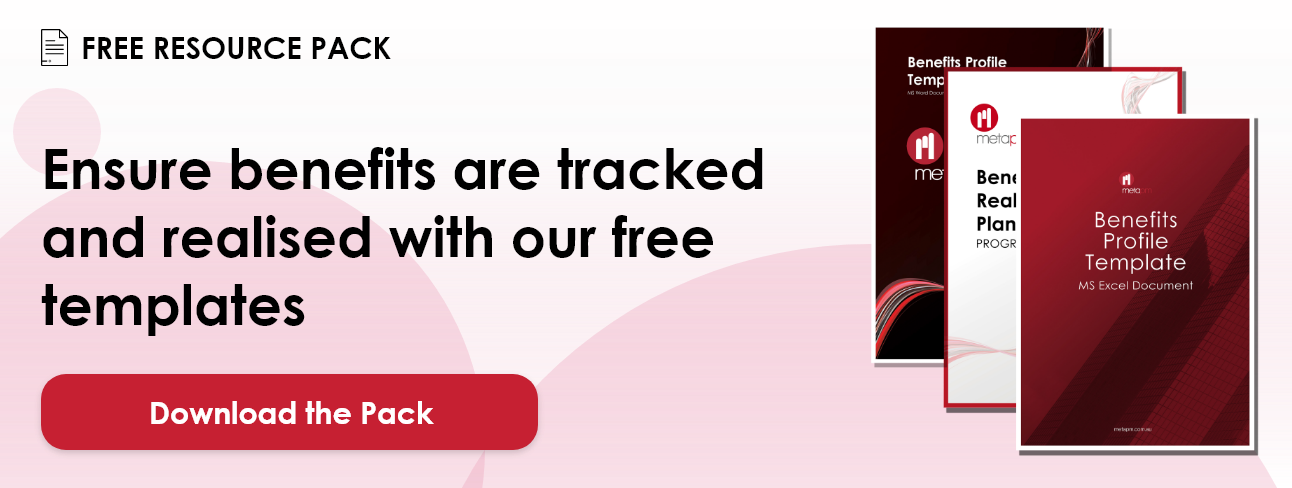Who cares about benefits?
Benefits Realisation Framework – Ambulance Victoria
MetaPM Team
This is a question I often ask people. The reply is often the usual suspects: Project Sponsors, Executives, Business Owners. Sometimes they even mention customers or society.
I then ask: if they care, then why are benefits so often neglected? This is harder to answer.
The reality is that people say benefits are important but think more about outputs and really care about outcomes. Benefits sound nice and may help justify a decision but they are quickly forgotten because they do not stay front of mind – have you ever bought a membership-based on benefits offered and never redeemed them? Or installed a solar system with energy-saving benefits?
Benefits are used to support individual projects and programs, rather than collectively representing the value from investing in change.
This results in a fractured approach where information about benefits end up buried in documents and spreadsheets – Business Cases, Project Plans, etc. – preventing effective benefits management, and leading to double counting and lack of visibility. And when a project or program ends, benefits tend to be archived with the rest of the documentation.
Progressive organisations will maintain a benefits register and even allocate people to manage ongoing benefits realisation, but scrutiny of the costs makes it hard to maintain the discipline of measuring ongoing benefits.
Go back to that solar system you installed – how long did you track the power being generated? A month? A year? It all becomes too hard for too little reward, and you have better things to do with your time. After a couple of years, you probably only think about it when you see it on your utility bill. But you will still be comforted by the outcome – lower power bills.
The organisational response to keeping benefits alive is to make a single person accountable for each benefit. But how do you enforce that accountability? Some places build it into performance KPIs, but what happens if someone leaves or moves into a new role? Getting everyone’s buy-in to benefits from past projects and the cost of tracking them becomes harder as time goes by.
The key point here is that benefits need to be transparent and visible to everyone involved, and measuring benefits needs to be as automated as possible using data from strategic and operational performance measurement systems.
Over the past five years, technology and tools have become available that allow benefits to be managed cost-effectively and reported widely. Intranet platforms provide reliable storage and content management, and BI tools bring together disparate data sources for tailored self-service analytics, visualisation, and reporting.
This is driving the conversations away from the bottom-up definition of discrete benefits associated with projects and programs towards the top-down breakdown of benefits and value realised from achieving strategic outcomes.

The question can now be asked of what is the best way to deliver outcomes, taking into account cost, risk, and ability to leverage change?
When you talk of outcomes you generate an emotional response from people that can be harnessed to drive change. By shifting to discussing outcomes and the value that can be gained from them, you can bring collective ownership and desire to realise benefits from change.
For the past 14 years, MetaPM has been helping organisations manage outcomes and benefits better through improving and aligning processes, frameworks, and expectations. We can now help you implement platforms for managing the data, information, and reporting, through rapid implementation of a cost-effective benefits realisation platform tailored to your organisation’s strategic outcomes and investment goals.
If you’d like the help of experienced consultants to realise your benefits, reach out to us.
 Gary Yorke is a Principal Consultant at MetaPM, with broad experience across industries, including Banking, Telecomms, Government, Infrastructure, and Utilities. He is a respected professional providing expertise in governance, strategy implementation, and capability development, working with global organisations to assess maturity and build capability. Gary was a founder member of the AIPM’s National and Victorian PMO SIGs, and established ‘The Office’ column on PMO matters in the AIPM Project Manager magazine.
Gary Yorke is a Principal Consultant at MetaPM, with broad experience across industries, including Banking, Telecomms, Government, Infrastructure, and Utilities. He is a respected professional providing expertise in governance, strategy implementation, and capability development, working with global organisations to assess maturity and build capability. Gary was a founder member of the AIPM’s National and Victorian PMO SIGs, and established ‘The Office’ column on PMO matters in the AIPM Project Manager magazine.
Weekly Newsletter
Subscribe to our newsletter today to keep up to date on what’s happening.

